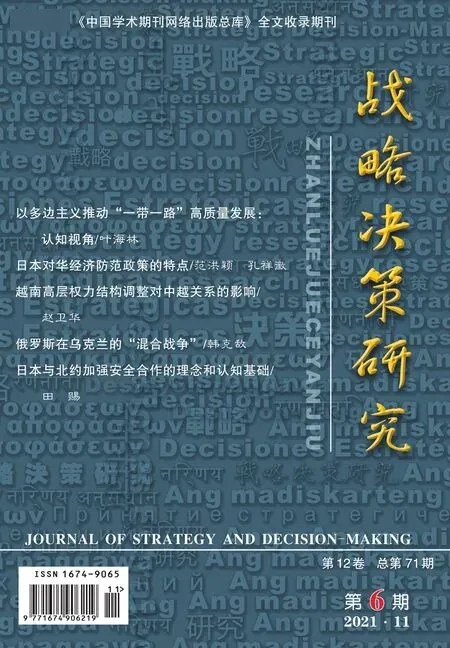abstract
2021-11-25
Promoting the High-Quality Development of "Belt and Road Initiatives" with Multilateralism:a Study in Cognitive Perspective
Ye Hailin
Abstract:This article outlined the cognitive risks of participants and related players of "Belt and Road Initiative" (BRI)in its high-quality development stage.It argued that the new development stage of BRI does not only rely on the effec⁃tiveness of the ongoing projects,but also on the cognition of various players on the impact of China's involvement.Thus China needs to carry forward the concept of multilateralism,address relevant risks multilaterally,and enhance the recogni⁃tion as well as acceptance of BRI and China inthe relevant countries.In the post-COVID-19 era,the Biden administration has made substantial adjustments to the US foreign policy and strengthened the role of the US-led alliance in order to compete with China,which will bring new challenges to the development of BRI.In order to cope with the various pressure caused by the adjustment of the US diplomatic strategy,the promotion of multilateralism helps China to hedge the "pseudo-multilateralism" centred around US hegemony.Multilateralism with extensive consultation,joint construction and shared benefits should be China's priorities.
Key words:Belt and Road Initiative;Multilateralism;Cognitive Risk;Sino-US Competition
Author:Ye Hailin,Professor,Deputy Director General of Bureau of Internation⁃al Cooperation,Chinese Academy of Social Sciences;Vice President,National Institute of International Strategy.
The Characteristics of Japan's economic prevention policy against China
Fan Hongying;Kong Xianghui
Abstract:Over the past 20 years,the economic interdependence between China and Japan has evolved into an asymmetry in favor of China.Since 2012,Japan's economic policy has strengthened its competition with and prevention against China.The characteristics of Japan's economic prevention policy against China are three-fold:the introduction of resources from outside East Asian to prevent China's dominance inEast Asian cooperation,the adjustment of the global supply chain to reduce its economic dependence on China,and the restructure of regional and global economic rules to hedge the "Belt and Road initiative".How⁃ever,the implementation of thispolicy is subject to relatively high economic costs and is constrained by the lack of self-sufficient material resources as well asthe "deficit" in external resource assistance.
Key words:Japan;China;East Asian Cooperation;Supply Chain;Economic Rules
Authors:Fan Hongying,Associate Professor,School of International Relations,Guangdong University of Foreign Studies;Research fellow at the Center for China's Regional Strategies in Neighbouring Area Studies,Guangdong University of Foreign Studies
Kong Xianghui,Graduate Student,School of International Relations,Guangdong University of Foreign Studies
Vietnam's Power Structure Adjustment after the 13th National Congress and Its Impact On China-Vietnam Relations
Zhao Weihua
Abstract:After the 13th National Congress of the Communist Party of Vietnam(CPV),the leadership structure of Vietnam has reverted to the "four pillars" model.The three-level power centre,which consists of the "four pillars",the Politburo of the CPV and the Central Committee,is further consolidated.In the "four pillars" model,while returning to the original power configuration,the balanced geographical representation betweennorthern and southern regions among top leaders was broken.Subsequently,the long-standing norm and tacit understanding of power balance has been completely broken,resulting in an imbalanced power structure.Inthe Politburo,an unprecedented balance between South and North has been demonstrated,especially that the South has achieved an absolute advan⁃tage in the succession echelon.In the Central Committee,the sharp rise of the military power has become another prominent feature of the adjustment of Viet⁃namesepower system.Although in all threelevels,the adjustment of Vietnam's leadership structure has shifted,in general it still maintains a rough balance.The power imbalance at different levels actually reflects the judgment of the Viet⁃namese leadership on their policypriorities.There are positive factors that may promote the stability of Sino-Vietnamese relations and cooperation,but also potential risks.To advance healthier development of the China-Vietnam relations,China needs to prepareahead.
Key words:the 13th National Congress of the Communist Party of Vietnam(CPV);Power Structure;China-Vietnam Relations
Author:Zhao Weihua,Professor of Institute of International Studies,Fudan Uni⁃versity.
Russia's Hybrid Warfare in Ukraine
Han Kedi
Abstract:After Russia's sudden seizure of Crimea and military interventionin eastern Ukraine in 2014,the concept of "Hybrid Warfare" was widely discusse⁃din academic and political circles.Russia and Ukraine have not declared war on each other,but are involved in a de facto war.The United States(US)and the European Union(EU)accused Russia of engaging in "Hybrid Warfare" in Ukraine,while Russia accused the US and the EU of instigating "Color Revolution" around Russia.Compared with "Traditional Warfare","Hybrid Warfare" generally has the following characteristics:small-scale,multi-dimensional,high-tech and well-camouflaged.In Ukraine,Russia has mainly applied four forms of "Hybrid Warfare":Proxy war,Information war,Cyber war,and war among special operations forces.These four new forms of war combine with the traditional conventional war to form the main body of "Hybrid Warfare".Russia's "Hybrid Warfare" in Ukraine has both gains and losses.The Kremlin successfully seized control ofCrimea and Donbas,but it lost Ukraine and other Central and Eastern European countries.In Ukraine,Russia learned from the western concept of "Hybrid Warfare" and developed it with distinctive Russian characteristics.The "Hybrid Warfare" studies in the US focuses on the resistance of the weak against the strong,while the Russian version focuses on the conquest of the weak by the strong.The research unitof the American school of "Hybrid Warfare" is mainly "non-state actors",while Russia's "Hybrid Warfare" mainly concerns "state actors".As a new form of warfare in the 21st century,the "Hybrid Warfare" of both the West and the East deserves our attention.
Key Words:Russia;Ukraine;Hybrid Warfare
Author:Han Kedi,Associate Research Fellow,Institute of Russian,East Euro⁃pean and Central Asian Studies,Chinese Academy of Social Sciences
The Analysisof Conceptual and Cognitive Basis of the Intensive Security Cooperation between Japan and NATO
Tian Ci
Abstract:In recent years,the political and security cooperation between Japan and NATO has been upgraded rapidly.This is because Japan and NATO have a common understanding of the status quo of the international order,the interna⁃tional security environment and their respective international roles.The shared understanding has laid a foundation for cooperation between Japan and NATO,which provides a wide range of opportunities for both Japan and NATO.Theyal⁃so have the same understanding of each other's roles,which makes the geograph⁃ical distance between Asia Pacific and Europe no longer an obstacle to their cooperation.These multiple unities in cognitions have promoted the upgrading of the cooperative relationship between Japan and NATO.
Key words:Japan;NATO;Cooperation;Cognition
Author:Tian Ci,Ph.D.Candidate of Graduate Institute for Taiwan Studies,Xia⁃men University
